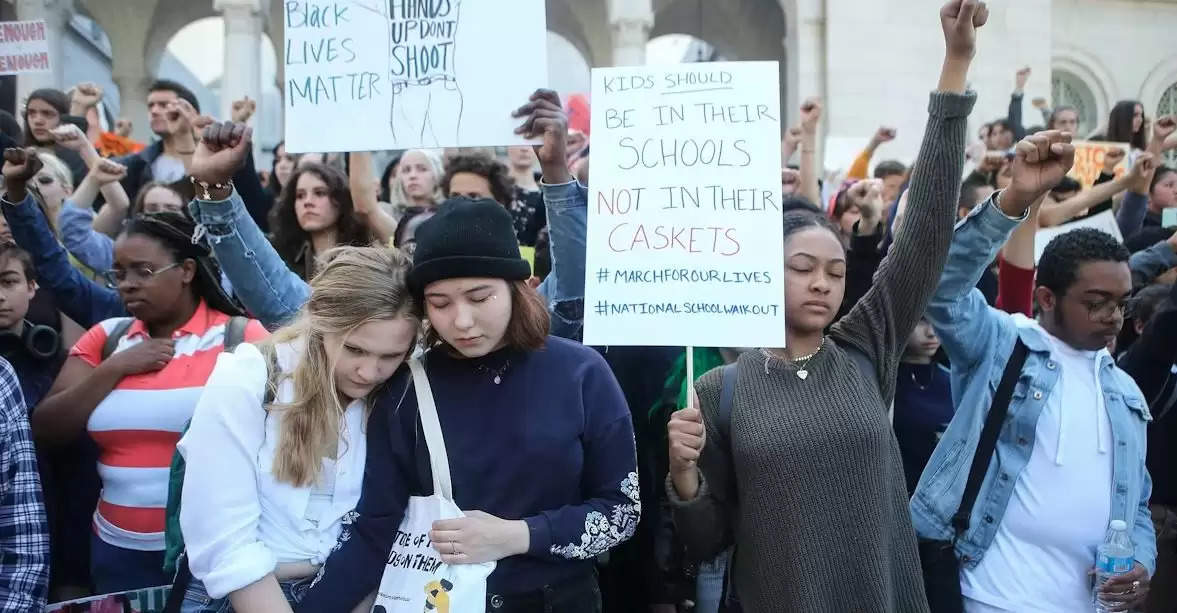Survivors and mental health experts share what they know about the long-term impact of school shootings on children
Roses hang from a fence and the American flag is lowered to honor the victims of the November 30, 2021 shooting at Oxford High School in Michigan.

Rebekah Schuler was walking to her 10th grade history class with her best friend, each with a shared headphone in her ear, blasting their favorite song, when gunshots and bloodcurdling screams sent them running for their lives.
It has been nearly three years since the 2021 Oxford High School shooting in suburban Detroit that killed four of her classmates, but time has shown her little mercy.
Sometimes she can restrain the flashbacks, tucking away the disturbing reminders into the darkest corner of her mind, but on other days she finds herself helplessly falling into the nightmare of her vivid memories. As if trapped in quicksand, every desperate attempt to crawl out of the flashback lodges her deeper into it.
Schuler, who was 16 at the time, is one of an estimated 3 million children and teens exposed to shootings every year in America. More than 1,300 of them have occurred in schools in the past decade, leaving students deserving of a nurturing education with trauma, according to Everytown for Gun Safety, an anti-gun violence advocacy non-profit organization.
One of the latest shootings, at Apalachee High School in Winder, Georgia, killed two 14-year-old students and two teachers and injured nine others. There have been at least 46 school shootings in the United States so far this year, as of September 6.
Mental health professionals who are studying the effects of shootings on young people have highlighted in their research an urgent need to provide survivors like Schuler with access to resources, like therapy, to manage resulting mental health issues that can permanently alter the trajectory of their adult lives.
Colt Gray, who is charged as an adult with four counts of murder in the deaths of Mason Schermerhorn and Christian Angulo, both 14, Richard Aspinwall, 39, and Cristina Irimie, 53 sits in the Barrow County courthouse during his first appearence for the Wednesday shooting at Apalachee High School, in Winder, Georgia, U.S., September 6, 2024. Brynn Anderson/Pool via
“We are growing a whole population of kids who will eventually be adults with anxiety disorders, post-traumatic stress disorder, and lack of trust and fear in the world around them, all which they wouldn’t have had if it were not for the shootings,”
Dr. Gail Saltz, a psychiatrist and clinical associate professor of psychiatry at the New York-Presbyterian Hospital and Weill Cornell Medical College, told CNN.
“Without help, this causes avoidance, avoidance of school, the very thing that they need to be able to truly grow as adults and be successful in life,” Saltz said. “We need to be really coming in right away with resources, with money to ensure their access to treatment, treatment that might need to go on for long periods of time.”
“Do not wait,” Saltz warned. “Ignoring it and hoping that it goes away won’t work.”
Recognizing and responding to trauma
Immediately following a school shooting, survivors who were in the direct vicinity of the attack – such as in the classroom where it happened – as well as students who were in the building at all may begin to exhibit signs of distress.
“They can develop some sort of an anxiety disorder. Some of those who were in close proximity will also develop symptoms of an acute stress reaction.
If that persists and they continue to have anxiety, depression, difficulty sleeping or intrusive flashback memories of the event, it may make them want to avoid things that remind them of that time,” Saltz said.
“You may see their grades start to drop. You may see them retreat into their room or not socialize with friends as they used to, not enjoy things that they were formally enjoying, sort of isolate themselves more. They may also have difficulty with sleep, with appetite,” Saltz added.
Signs of distress will appear in children differently, depending on their age. Some may not appear distressed or unhappy at all, but will show serious symptoms of regression in behavior and developmental milestones.
“They had been able to go for sleepovers at their friend’s house. They can’t do that anymore,” Saltz said. “They had been able to sleep through the night. They can’t do that anymore. They had been able to separate from you. They can’t do that. For very young kids, they’ve been toilet trained, but now they regress and they’re having accidents.”
Along with seeking professional help, parents can aid in their children’s trauma response by allowing them to express their feelings through various outlets aside from verbal communication, like journaling or drawing.
If weeks after the shooting the child remains severely anxious or exhibits a low mood and avoids regular habits, hobbies and routines, Saltz urges parents to find them a therapist. She does not advise parents whose children want to avoid school to encourage them to stay home or skip classes.
